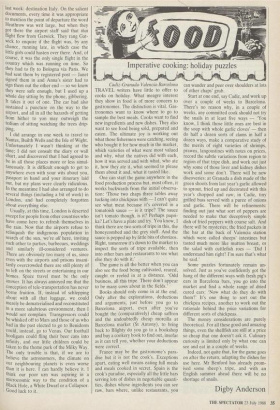Imperative cooking: holiday puzzles
4,_.404L tih_joik
a
One can start the game anywhere in the food production process but, most often, it works backwards from the initial observa- tion: 'Those two chaps three tables away tucking into chickpeas with — I can't quite see what meat because it's covered in a tomatoish sauce — is it tripe? The sauce isn't tomato though, is it? Perhaps papri- ka? Let's have a plate and try. You know, I think there are two sorts of tripe in this, the honeycombed and the grey stuff. And the sauce is pepped up by little bits of chorizos. Right, tomorrow it's down to the market to inspect the sorts of tripe available, then into other bars and restaurants to see what else they do with it.'
The game is all the better when you can also see the food being cultivated, reared, caught or reeled in at a distance. 'Odd business, all this tripe. There don't appear to be many cows about in the fields.'
Books should only come in at the end. Only after the explorations, deductions and arguments, just before you go to Barcelona airport, even after you've bought the (comparatively) cheap saffron and the undoubtedly cheap morcilla at Barcelona market (St Antony), to bring back to Blighty do you go to a bookshop and buy a cookery book to find out, insofar as it can tell you, whether your deductions were correct.
France may be the gastronome's para- dise but it is not the cook's. Exceptions apart, eating well means eating full meals and meals cooked in secret. Spain is the cook's paradise, especially all the little bars serving lots of dishes in negotiable quanti- ties, dishes whose ingredients you can see raw, bars where, unlike restaurants, you can wander and peer over shoulders at lots of other chaps' grub.
Start at one end, say Cadiz, and work up over a couple of weeks to Barcelona. There's no reason why, in a couple of weeks, any committed cook should not try the snails in at least five ways — 'You know, I think those little ones are best in the soup with whole garlic cloves' — then do half a dozen sorts of clams in half a dozen ways, make a comparative study of the merits of eight varieties of shrimps, prawns, langoustines with notes on prices, record the subtle variations from region to region of that tripe dish, and work out just why some of those liver and kidney dishes work and some don't. There will be new discoveries: at Granada a dish made of the green shoots from last year's garlic allowed to sprout, fried up and decorated with this year's chopped and raw; in Cadiz, tiny grilled bass served with a puree of onions and garlic. There will be refinements: finding out just what sort of peppers are needed to make that deceptively simple dish of fried peppers with coarse salt. And there will be mysteries; the fried packets in the bar at the back of Valencia station which were called sheeps' intestines but tasted much more like mutton breast, or the salad with cuttlefish roes — Did I understand him right? I'm sure that's what he said.'
Some puzzles fortunately remain un- solved. Just as you've confidently got the hang of the different ways with fresh pig's ears in Barcelona bars, you go into the market and find a whole range of dried cured ears: 'Now what do they do with them?' It's one thing to sort out the chickpea recipes, another to work out the rationale behind the price variations for different sorts of chickpeas.
The money considerations are purely theoretical. For all these good and amazing things, even the shellfish are still at a price so cheap that one doesn't ask it. Culinary curiosity is limited only by what one can see and eat in a couple of weeks.
Indeed, not quite that, for the game goes on after the return, adapting the dishes for use here. Mr Benford has already prom- ised some sheep's tripe, and with an English summer ahead there will be no shortage of snails.
Digby Anderson














































 Previous page
Previous page